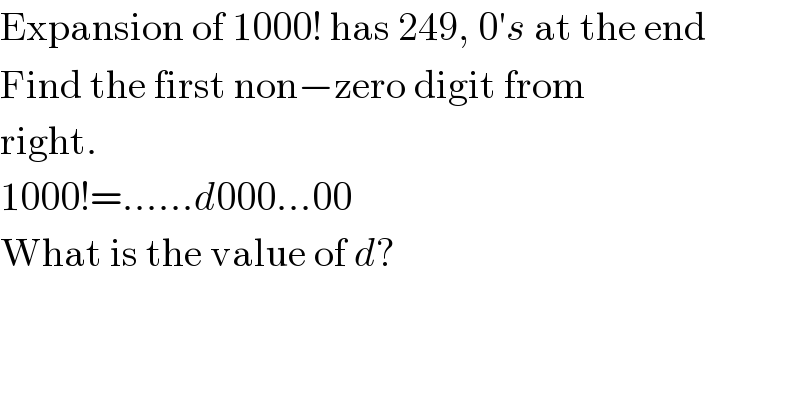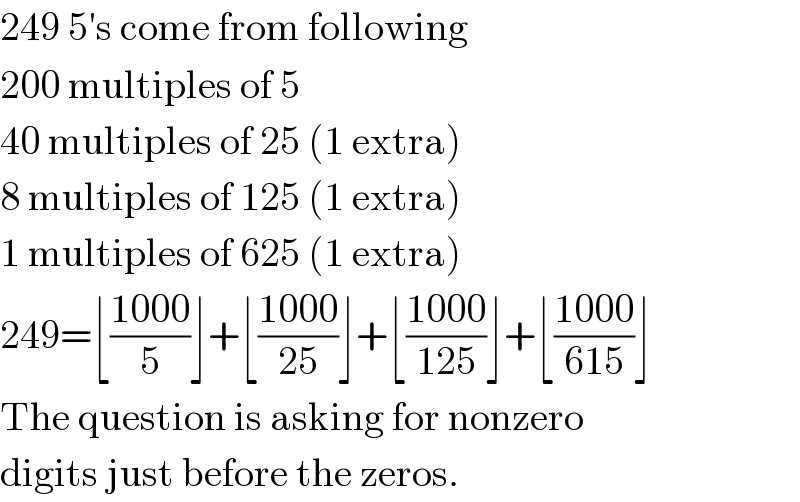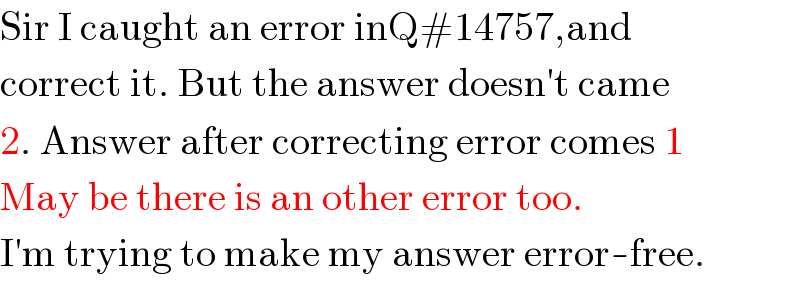Question Number 13724 by prakash jain last updated on 22/May/17

$$\mathrm{Expansion}\:\mathrm{of}\:\mathrm{1000}!\:\mathrm{has}\:\mathrm{249},\:\mathrm{0}'{s}\:\mathrm{at}\:\mathrm{the}\:\mathrm{end} \\ $$$$\mathrm{Find}\:\mathrm{the}\:\mathrm{first}\:\mathrm{non}−\mathrm{zero}\:\mathrm{digit}\:\mathrm{from} \\ $$$$\mathrm{right}. \\ $$$$\mathrm{1000}!=……{d}\mathrm{000}…\mathrm{00} \\ $$$$\mathrm{What}\:\mathrm{is}\:\mathrm{the}\:\mathrm{value}\:\mathrm{of}\:{d}? \\ $$
Commented by prakash jain last updated on 02/Jun/17

$$\mathrm{249}\:\mathrm{5}'\mathrm{s}\:\mathrm{come}\:\mathrm{from}\:\mathrm{following} \\ $$$$\mathrm{200}\:\mathrm{multiples}\:\mathrm{of}\:\mathrm{5} \\ $$$$\mathrm{40}\:\mathrm{multiples}\:\mathrm{of}\:\mathrm{25}\:\left(\mathrm{1}\:\mathrm{extra}\right) \\ $$$$\mathrm{8}\:\mathrm{multiples}\:\mathrm{of}\:\mathrm{125}\:\left(\mathrm{1}\:\mathrm{extra}\right) \\ $$$$\mathrm{1}\:\mathrm{multiples}\:\mathrm{of}\:\mathrm{625}\:\left(\mathrm{1}\:\mathrm{extra}\right) \\ $$$$\mathrm{249}=\lfloor\frac{\mathrm{1000}}{\mathrm{5}}\rfloor+\lfloor\frac{\mathrm{1000}}{\mathrm{25}}\rfloor+\lfloor\frac{\mathrm{1000}}{\mathrm{125}}\rfloor+\lfloor\frac{\mathrm{1000}}{\mathrm{615}}\rfloor \\ $$$$\mathrm{The}\:\mathrm{question}\:\mathrm{is}\:\mathrm{asking}\:\mathrm{for}\:\mathrm{nonzero} \\ $$$$\mathrm{digits}\:\mathrm{just}\:\mathrm{before}\:\mathrm{the}\:\mathrm{zeros}. \\ $$
Commented by RasheedSoomro last updated on 03/Jun/17

$$\mathrm{Thanks}\:\mathrm{for}\:\mathrm{clarification}.\mathrm{I}\:\mathrm{felt}\:\mathrm{mistake}\:\mathrm{of}\: \\ $$$$\mathrm{my}\:\mathrm{thinking}\:\mathrm{after}\:\mathrm{a}\:\mathrm{while}.\mathrm{That}'\mathrm{s}\:\mathrm{why} \\ $$$$\mathrm{I}\:\mathrm{deleted}\:\mathrm{my}\:\mathrm{comment}. \\ $$
Commented by RasheedSoomro last updated on 12/Jun/17

$$\mathrm{For}\:\mathrm{right}\:\mathrm{anzwer}\:\mathrm{please}\:\mathrm{see}\:\mathrm{Q}#\mathrm{15543} \\ $$
Answered by RasheedSoomro last updated on 12/Jun/17
![If d is required digit then ((1000!)/(10^(249) ))≡d(mod 10) ((1000!)/(2^(249) ×5^(249) ))≡d(mod 10) ((1000!)/(2^(52) ×(5×10×15×...×1000)))≡d(mod 10) All the 5′s come in 5×10×...×1000. Some 2′s are also included in 5×...×1000 One 2 per each multiple of 10′s =100 2′s One extra 2 per each multiple of 20′s =50 2′s One extra 2 per each multiple of 40′s =25 2′s One extra 2 per each multiple of 80′s =12 2′s One extra 2 per each multiple of 160′s =6 2′s One extra 2 per each multiple of 320′s =3 2′s One extra 2 per each multiple of 640′s =1 2′s _(−) Total 2′s included in 5×10×...×1000=197 2′s Remaining 2′s =249−197=52 ((1000!)/(2^(52) ×(5×10×15×...×1000)))×2^(52) ≡d×2^(52) (mod 10) ((1000!)/(5×10×15×...×1000))≡d×2^(52) (mod 10) ((1000!)/(5×10×15×...×1000))≡6(mod 10) (For proof see Q# 14757 ) So d×2^(52) ≡6(mod 10)............(i) We can verify that 2^4 ≡6(mod 10) (2^4 )^3 ≡6^3 ≡6(mod 10) 2^(12) ×2≡6×2≡2(mod 10) 2^(13) ≡2(mod 10) (2^(13) )^4 ≡2^4 ≡6(mod 10) 2^(52) ≡6(mod 10) 1×2^(52) ≡1×6≡6(mod 10) ]×1......(ii) 2×2^(52) ≡2×6≡2(mod 10) ]×2 3×2^(52) ≡3×6≡8(mod 10) ]×3 4×2^(52) ≡4×6≡4(mod 10) ]×4 5×2^(52) ≡5×6≡0(mod 10) ]×5 6×2^(52) ≡6×6≡6(mod 10) ]×6.....(iii) 7×2^(52) ≡7×6≡2(mod 10) ]×7 8×2^(52) ≡8×6≡8(mod 10) ]×8 9×2^(52) ≡9×6≡4(mod 10) ]×9 Comparing (i) with (ii) & (ii), we see that d=1,6 The answer is 1 or 6 This answer is wrong For right answer see my answer of Q#15543.](https://www.tinkutara.com/question/Q14875.png)
$$\mathrm{If}\:\mathrm{d}\:\mathrm{is}\:\mathrm{required}\:\mathrm{digit}\:\mathrm{then} \\ $$$$\frac{\mathrm{1000}!}{\mathrm{10}^{\mathrm{249}} }\equiv\mathrm{d}\left(\mathrm{mod}\:\mathrm{10}\right) \\ $$$$\frac{\mathrm{1000}!}{\mathrm{2}^{\mathrm{249}} ×\mathrm{5}^{\mathrm{249}} }\equiv\mathrm{d}\left(\mathrm{mod}\:\mathrm{10}\right) \\ $$$$\frac{\mathrm{1000}!}{\mathrm{2}^{\mathrm{52}} ×\left(\mathrm{5}×\mathrm{10}×\mathrm{15}×…×\mathrm{1000}\right)}\equiv\mathrm{d}\left(\mathrm{mod}\:\mathrm{10}\right) \\ $$$$\mathrm{All}\:\mathrm{the}\:\mathrm{5}'\mathrm{s}\:\mathrm{come}\:\mathrm{in}\:\mathrm{5}×\mathrm{10}×…×\mathrm{1000}. \\ $$$$\mathrm{Some}\:\mathrm{2}'\mathrm{s}\:\mathrm{are}\:\mathrm{also}\:\mathrm{included}\:\mathrm{in}\:\mathrm{5}×…×\mathrm{1000} \\ $$$$\:\:\:\:\:\mathrm{One}\:\mathrm{2}\:\mathrm{per}\:\mathrm{each}\:\mathrm{multiple}\:\:\mathrm{of}\:\mathrm{10}'\mathrm{s}\:=\mathrm{100}\:\mathrm{2}'\mathrm{s} \\ $$$$\:\:\:\:\:\mathrm{One}\:\mathrm{extra}\:\:\mathrm{2}\:\mathrm{per}\:\mathrm{each}\:\mathrm{multiple}\:\:\mathrm{of}\:\mathrm{20}'\mathrm{s}\:=\mathrm{50}\:\mathrm{2}'\mathrm{s} \\ $$$$\:\:\:\:\:\mathrm{One}\:\mathrm{extra}\:\:\mathrm{2}\:\mathrm{per}\:\mathrm{each}\:\mathrm{multiple}\:\:\mathrm{of}\:\mathrm{40}'\mathrm{s}\:=\mathrm{25}\:\mathrm{2}'\mathrm{s} \\ $$$$\:\:\:\:\:\mathrm{One}\:\mathrm{extra}\:\:\mathrm{2}\:\mathrm{per}\:\mathrm{each}\:\mathrm{multiple}\:\:\mathrm{of}\:\mathrm{80}'\mathrm{s}\:=\mathrm{12}\:\mathrm{2}'\mathrm{s} \\ $$$$\:\:\:\:\:\mathrm{One}\:\mathrm{extra}\:\:\mathrm{2}\:\mathrm{per}\:\mathrm{each}\:\mathrm{multiple}\:\:\mathrm{of}\:\mathrm{160}'\mathrm{s}\:=\mathrm{6}\:\mathrm{2}'\mathrm{s} \\ $$$$\:\:\:\:\:\mathrm{One}\:\mathrm{extra}\:\:\mathrm{2}\:\mathrm{per}\:\mathrm{each}\:\mathrm{multiple}\:\:\mathrm{of}\:\mathrm{320}'\mathrm{s}\:=\mathrm{3}\:\mathrm{2}'\mathrm{s} \\ $$$$\:\:\:\:\:\mathrm{One}\:\mathrm{extra}\:\:\mathrm{2}\:\mathrm{per}\:\mathrm{each}\:\mathrm{multiple}\:\:\mathrm{of}\:\underset{−} {\mathrm{640}'\mathrm{s}\:=\mathrm{1}\:\mathrm{2}'\mathrm{s}\:\:\:\:} \\ $$$$\:\:\:\:\:\:\mathrm{Total}\:\mathrm{2}'\mathrm{s}\:\mathrm{included}\:\mathrm{in}\:\mathrm{5}×\mathrm{10}×…×\mathrm{1000}=\mathrm{197}\:\:\mathrm{2}'\mathrm{s} \\ $$$$\:\:\:\:\:\:\:\mathrm{Remaining}\:\mathrm{2}'\mathrm{s}\:=\mathrm{249}−\mathrm{197}=\mathrm{52} \\ $$$$\frac{\mathrm{1000}!}{\mathrm{2}^{\mathrm{52}} ×\left(\mathrm{5}×\mathrm{10}×\mathrm{15}×…×\mathrm{1000}\right)}×\mathrm{2}^{\mathrm{52}} \equiv\mathrm{d}×\mathrm{2}^{\mathrm{52}} \left(\mathrm{mod}\:\mathrm{10}\right) \\ $$$$\frac{\mathrm{1000}!}{\mathrm{5}×\mathrm{10}×\mathrm{15}×…×\mathrm{1000}}\equiv\mathrm{d}×\mathrm{2}^{\mathrm{52}} \left(\mathrm{mod}\:\mathrm{10}\right) \\ $$$$\frac{\mathrm{1000}!}{\mathrm{5}×\mathrm{10}×\mathrm{15}×…×\mathrm{1000}}\equiv\mathrm{6}\left(\mathrm{mod}\:\mathrm{10}\right)\: \\ $$$$\:\:\:\:\:\:\:\:\:\:\:\:\:\:\:\:\:\:\:\:\:\:\:\:\:\:\:\:\:\:\:\:\:\:\:\:\:\:\left(\mathrm{For}\:\mathrm{proof}\:\mathrm{see}\:\mathrm{Q}#\:\mathrm{14757}\:\:\:\right) \\ $$$$\mathrm{So} \\ $$$$\:\:\:\:\:\:\mathrm{d}×\mathrm{2}^{\mathrm{52}} \equiv\mathrm{6}\left(\mathrm{mod}\:\mathrm{10}\right)…………\left(\mathrm{i}\right) \\ $$$$\:\:\mathrm{We}\:\mathrm{can}\:\mathrm{verify}\:\mathrm{that} \\ $$$$\:\:\:\:\:\:\:\:\:\:\:\:\:\:\:\:\:\:\mathrm{2}^{\mathrm{4}} \equiv\mathrm{6}\left(\mathrm{mod}\:\mathrm{10}\right) \\ $$$$\:\:\:\:\:\:\:\:\:\:\:\:\:\:\:\:\:\:\left(\mathrm{2}^{\mathrm{4}} \right)^{\mathrm{3}} \equiv\mathrm{6}^{\mathrm{3}} \equiv\mathrm{6}\left(\mathrm{mod}\:\mathrm{10}\right) \\ $$$$\:\:\:\:\:\:\:\:\:\:\:\:\:\:\:\:\:\:\mathrm{2}^{\mathrm{12}} ×\mathrm{2}\equiv\mathrm{6}×\mathrm{2}\equiv\mathrm{2}\left(\mathrm{mod}\:\mathrm{10}\right) \\ $$$$\:\:\:\:\:\:\:\:\:\:\:\:\:\:\:\:\:\:\mathrm{2}^{\mathrm{13}} \equiv\mathrm{2}\left(\mathrm{mod}\:\mathrm{10}\right) \\ $$$$\:\:\:\:\:\:\:\:\:\:\:\:\:\:\:\:\:\:\left(\mathrm{2}^{\mathrm{13}} \right)^{\mathrm{4}} \equiv\mathrm{2}^{\mathrm{4}} \equiv\mathrm{6}\left(\mathrm{mod}\:\mathrm{10}\right) \\ $$$$\:\:\:\:\:\:\:\:\:\:\:\:\:\:\:\mathrm{2}^{\mathrm{52}} \equiv\mathrm{6}\left(\mathrm{mod}\:\mathrm{10}\right) \\ $$$$\left.\:\:\:\:\:\:\:\:\:\:\:\:\:\:\:\mathrm{1}×\mathrm{2}^{\mathrm{52}} \equiv\mathrm{1}×\mathrm{6}\equiv\mathrm{6}\left(\mathrm{mod}\:\mathrm{10}\right)\:\:\:\:\:\:\:\right]×\mathrm{1}……\left(\mathrm{ii}\right) \\ $$$$\left.\:\:\:\:\:\:\:\:\:\:\:\:\:\:\:\mathrm{2}×\mathrm{2}^{\mathrm{52}} \equiv\mathrm{2}×\mathrm{6}\equiv\mathrm{2}\left(\mathrm{mod}\:\mathrm{10}\right)\:\:\:\:\:\:\:\right]×\mathrm{2} \\ $$$$\left.\:\:\:\:\:\:\:\:\:\:\:\:\:\:\:\mathrm{3}×\mathrm{2}^{\mathrm{52}} \equiv\mathrm{3}×\mathrm{6}\equiv\mathrm{8}\left(\mathrm{mod}\:\mathrm{10}\right)\:\:\:\:\:\:\:\right]×\mathrm{3} \\ $$$$\left.\:\:\:\:\:\:\:\:\:\:\:\:\:\:\mathrm{4}×\mathrm{2}^{\mathrm{52}} \equiv\mathrm{4}×\mathrm{6}\equiv\mathrm{4}\left(\mathrm{mod}\:\mathrm{10}\right)\:\:\:\:\:\:\:\right]×\mathrm{4} \\ $$$$\left.\:\:\:\:\:\:\:\:\:\:\:\:\:\:\mathrm{5}×\mathrm{2}^{\mathrm{52}} \equiv\mathrm{5}×\mathrm{6}\equiv\mathrm{0}\left(\mathrm{mod}\:\mathrm{10}\right)\:\:\:\:\:\:\:\right]×\mathrm{5} \\ $$$$\left.\:\:\:\:\:\:\:\:\:\:\:\:\:\:\mathrm{6}×\mathrm{2}^{\mathrm{52}} \equiv\mathrm{6}×\mathrm{6}\equiv\mathrm{6}\left(\mathrm{mod}\:\mathrm{10}\right)\:\:\:\:\:\:\:\right]×\mathrm{6}…..\left(\mathrm{iii}\right) \\ $$$$\left.\:\:\:\:\:\:\:\:\:\:\:\:\:\:\mathrm{7}×\mathrm{2}^{\mathrm{52}} \equiv\mathrm{7}×\mathrm{6}\equiv\mathrm{2}\left(\mathrm{mod}\:\mathrm{10}\right)\:\:\:\:\:\:\:\right]×\mathrm{7} \\ $$$$\left.\:\:\:\:\:\:\:\:\:\:\:\:\:\:\mathrm{8}×\mathrm{2}^{\mathrm{52}} \equiv\mathrm{8}×\mathrm{6}\equiv\mathrm{8}\left(\mathrm{mod}\:\mathrm{10}\right)\:\:\:\:\:\:\:\right]×\mathrm{8} \\ $$$$\left.\:\:\:\:\:\:\:\:\:\:\:\:\:\:\mathrm{9}×\mathrm{2}^{\mathrm{52}} \equiv\mathrm{9}×\mathrm{6}\equiv\mathrm{4}\left(\mathrm{mod}\:\mathrm{10}\right)\:\:\:\:\:\:\:\right]×\mathrm{9} \\ $$$$\mathrm{Comparing}\:\left(\mathrm{i}\right)\:\mathrm{with}\:\left(\mathrm{ii}\right)\:\&\:\left(\mathrm{ii}\right),\:\mathrm{we}\:\mathrm{see}\:\mathrm{that} \\ $$$$\:\:\:\:\:\:\:\:\:\:\:\:\:\:\:\:\mathrm{d}=\mathrm{1},\mathrm{6} \\ $$$$\mathrm{The}\:\mathrm{answer}\:\mathrm{is}\:\:\mathrm{1}\:\:\mathrm{or}\:\:\:\mathrm{6} \\ $$$$\mathrm{This}\:\mathrm{answer}\:\mathrm{is}\:\mathrm{wrong} \\ $$$$\mathrm{For}\:\mathrm{right}\:\mathrm{answer}\:\mathrm{see}\:\mathrm{my}\:\mathrm{answer} \\ $$$$\mathrm{of}\:\mathrm{Q}#\mathrm{15543}. \\ $$
Commented by RasheedSoomro last updated on 10/Jun/17
![Main Steps ((1000!)/(10^(249) ))≡d(mod 10) ((1000!)/(2^(52) ×(5×10×15×...×1000)))≡d(mod 10) ((1000!)/(5×10×15×...×1000))≡6(mod 10) (Q#14757) d×2^(52) ≡6(mod 10) 1×2^(52) ≡1×6≡6(mod 10) ]×1.....(ii) 6×2^(52) ≡6×6≡6 d=1,6](https://www.tinkutara.com/question/Q14888.png)
$$\mathrm{Main}\:\mathrm{Steps} \\ $$$$\frac{\mathrm{1000}!}{\mathrm{10}^{\mathrm{249}} }\equiv\mathrm{d}\left(\mathrm{mod}\:\mathrm{10}\right) \\ $$$$\frac{\mathrm{1000}!}{\mathrm{2}^{\mathrm{52}} ×\left(\mathrm{5}×\mathrm{10}×\mathrm{15}×…×\mathrm{1000}\right)}\equiv\mathrm{d}\left(\mathrm{mod}\:\mathrm{10}\right) \\ $$$$ \\ $$$$\frac{\mathrm{1000}!}{\mathrm{5}×\mathrm{10}×\mathrm{15}×…×\mathrm{1000}}\equiv\mathrm{6}\left(\mathrm{mod}\:\mathrm{10}\right)\:\:\left(\mathrm{Q}#\mathrm{14757}\right) \\ $$$$\:\:\:\:\:\:\mathrm{d}×\mathrm{2}^{\mathrm{52}} \equiv\mathrm{6}\left(\mathrm{mod}\:\mathrm{10}\right) \\ $$$$\left.\:\:\:\:\:\:\mathrm{1}×\mathrm{2}^{\mathrm{52}} \equiv\mathrm{1}×\mathrm{6}\equiv\mathrm{6}\left(\mathrm{mod}\:\mathrm{10}\right)\:\:\:\:\:\:\:\right]×\mathrm{1}…..\left(\mathrm{ii}\right) \\ $$$$\:\:\:\:\:\:\:\mathrm{6}×\mathrm{2}^{\mathrm{52}} \equiv\mathrm{6}×\mathrm{6}\equiv\mathrm{6} \\ $$$$\:\:\:\:\:\:\:\mathrm{d}=\mathrm{1},\mathrm{6} \\ $$$$ \\ $$
Commented by mrW1 last updated on 05/Jun/17

$${thank}\:{you}!\:{i}\:{am}\:{very}\:{impressed}!\: \\ $$$${i}\:{need}\:{more}\:{time}\:{to}\:{understand}\:{your} \\ $$$${working}. \\ $$$${please}\:{check}!\:{the}\:{last}\:{non}−{zero}\:{digit} \\ $$$${should}\:{be}\:\mathrm{2}. \\ $$
Commented by RasheedSoomro last updated on 05/Jun/17

$$\mathrm{Sir}\:\mathrm{I}\:\mathrm{caught}\:\mathrm{an}\:\mathrm{error}\:\mathrm{inQ}#\mathrm{14757},\mathrm{and} \\ $$$$\mathrm{correct}\:\mathrm{it}.\:\mathrm{But}\:\mathrm{the}\:\mathrm{answer}\:\mathrm{doesn}'\mathrm{t}\:\mathrm{came} \\ $$$$\mathrm{2}.\:\mathrm{Answer}\:\mathrm{after}\:\mathrm{correcting}\:\mathrm{error}\:\mathrm{comes}\:\mathrm{1} \\ $$$$\mathrm{May}\:\mathrm{be}\:\mathrm{there}\:\mathrm{is}\:\mathrm{an}\:\mathrm{other}\:\mathrm{error}\:\mathrm{too}. \\ $$$$\mathrm{I}'\mathrm{m}\:\mathrm{trying}\:\mathrm{to}\:\mathrm{make}\:\mathrm{my}\:\mathrm{answer}\:\mathrm{error}-\mathrm{free}. \\ $$
Commented by RasheedSoomro last updated on 05/Jun/17

$$\mathrm{I}\:\mathrm{had}\:\mathrm{edited}\:\mathrm{this}\:\mathrm{post}\:\mathrm{and}\:\mathrm{once}\:\mathrm{changes} \\ $$$$\mathrm{had}\:\mathrm{been}\:\mathrm{public} \\ $$$$\mathrm{But}\:\mathrm{now}\:\mathrm{after}\:\mathrm{few}\:\mathrm{hours}\:,\:\mathrm{I}\:\mathrm{am}\:\mathrm{seeing}\:\mathrm{an}\:\mathrm{old}\:\mathrm{version}\:\mathrm{of} \\ $$$$\mathrm{the}\:\mathrm{post}.\:\mathrm{I}\:\mathrm{mean}\:\mathrm{changes}\:\mathrm{disappeared}!!! \\ $$$$!?!!!???!!! \\ $$
Commented by mrW1 last updated on 05/Jun/17

$${I}\:{saw}\:{your}\:{changed}\:{post}\:{indeed}.\:{How}\: \\ $$$${could}\:{the}\:{changes}\:{go}\:{lost}? \\ $$
Commented by RasheedSoomro last updated on 05/Jun/17

$$\mathrm{Thanks}\:\mathrm{for}\:\mathrm{witness}!\:\mathrm{I}\:\mathrm{have}\:\:\mathrm{reported} \\ $$$$\mathrm{to}\:\mathrm{the}\:\mathrm{developer}\:\mathrm{of}\:\mathrm{the}\:\mathrm{forum}\:\mathrm{also}. \\ $$
Answered by b.e.h.i.8.3.4.1.7@gmail.com last updated on 11/Jun/17
![1000!=2^α 3^β 5^γ ........ n≤x<n+1⇒[x]=n α=[((1000)/2)]+[((1000)/2^2 )]+[((1000)/2^3 )]+[((1000)/2^4 )]+[((1000)/2^5 )]+ +[((1000)/2^6 )]+[((1000)/2^7 )]+[((1000)/2^8 )]+[((1000)/2^9 )]+[((1000)/2^(10) )]+.... =500+250+125+62+31+15+7+3+1+0=994 γ=[((1000)/5)]+[((1000)/(25))]+[((1000)/(125))]+[((1000)/(625))]+0+...= =200+40+8+1+0=249 so: 1000! ,is dividible by number: (2×5)^(249) .i.e: 1000! have 249 zero′s on it′s end.](https://www.tinkutara.com/question/Q15486.png)
$$\mathrm{1000}!=\mathrm{2}^{\alpha} \mathrm{3}^{\beta} \mathrm{5}^{\gamma} …….. \\ $$$${n}\leqslant{x}<{n}+\mathrm{1}\Rightarrow\left[{x}\right]={n} \\ $$$$\alpha=\left[\frac{\mathrm{1000}}{\mathrm{2}}\right]+\left[\frac{\mathrm{1000}}{\mathrm{2}^{\mathrm{2}} }\right]+\left[\frac{\mathrm{1000}}{\mathrm{2}^{\mathrm{3}} }\right]+\left[\frac{\mathrm{1000}}{\mathrm{2}^{\mathrm{4}} }\right]+\left[\frac{\mathrm{1000}}{\mathrm{2}^{\mathrm{5}} }\right]+ \\ $$$$+\left[\frac{\mathrm{1000}}{\mathrm{2}^{\mathrm{6}} }\right]+\left[\frac{\mathrm{1000}}{\mathrm{2}^{\mathrm{7}} }\right]+\left[\frac{\mathrm{1000}}{\mathrm{2}^{\mathrm{8}} }\right]+\left[\frac{\mathrm{1000}}{\mathrm{2}^{\mathrm{9}} }\right]+\left[\frac{\mathrm{1000}}{\mathrm{2}^{\mathrm{10}} }\right]+…. \\ $$$$=\mathrm{500}+\mathrm{250}+\mathrm{125}+\mathrm{62}+\mathrm{31}+\mathrm{15}+\mathrm{7}+\mathrm{3}+\mathrm{1}+\mathrm{0}=\mathrm{994} \\ $$$$\gamma=\left[\frac{\mathrm{1000}}{\mathrm{5}}\right]+\left[\frac{\mathrm{1000}}{\mathrm{25}}\right]+\left[\frac{\mathrm{1000}}{\mathrm{125}}\right]+\left[\frac{\mathrm{1000}}{\mathrm{625}}\right]+\mathrm{0}+…= \\ $$$$=\mathrm{200}+\mathrm{40}+\mathrm{8}+\mathrm{1}+\mathrm{0}=\mathrm{249} \\ $$$${so}:\:\mathrm{1000}!\:,{is}\:{dividible}\:{by}\:{number}: \\ $$$$\left(\mathrm{2}×\mathrm{5}\right)^{\mathrm{249}} .{i}.{e}:\:\mathrm{1000}!\:{have}\:\mathrm{249}\:{zero}'{s}\:{on} \\ $$$${it}'{s}\:{end}. \\ $$
